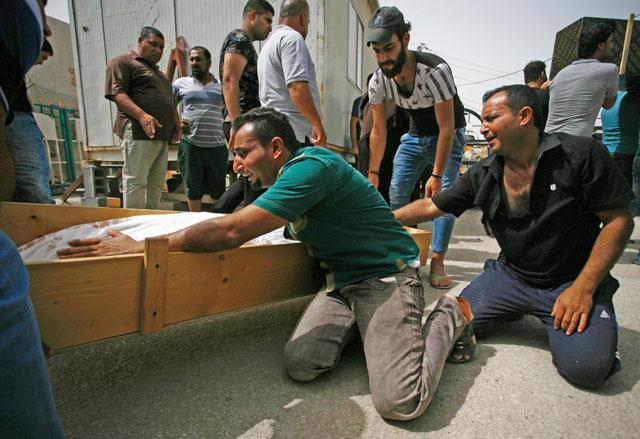You are here
Iraqis mourn 200 dead in Baghdad bombing
By AFP - Jul 05,2016 - Last updated at Jul 05,2016
BAGHDAD — Iraqis on Monday mourned more than 200 people killed in a Baghdad suicide bombing claimed by the Daesh terror group and accused the government of not doing enough to protect them.
The search continued for bodies at the site of the attack, which ripped through the Karrada district early on Sunday as it teemed with shoppers ahead of this week's holiday marking the end of the Muslim fasting month of Ramadan.
Prime Minister Haider Al Abadi announced efforts to address longstanding security flaws in Baghdad following the blast, which came a week after Iraqi forces recaptured the city of Fallujah from Daesh.
But on the streets, Iraqis were angry at the government's inability to keep residents safe, even as its forces push Daesh back outside the capital.
"I swear to God, the government is a failure," said a woman who gave her name as Umm Alaa, who lost her apartment in the attack.
Daesh "tactics are changing. Why does the Iraqi government have fixed tactics?" a man asked at the site of the bombing, criticising the government's "stupid checkpoints" and use of fake bomb detectors.
And Inam Al Zubaidi said she came to the site to offer condolences to “the families of the martyrs, who fell in this place because of the failed government”.
As Iraq marked three days of national mourning, security and medical officials told AFP the number of dead from the attack had risen to at least 213. More than 200 were wounded, they said.
Digging through ashes
In Karrada, a young man lit a candle on a staircase leading to the basement of one charred building, adding to dozens of others left by mourners at the site of the bombing, which sparked infernos in nearby buildings.
Down the stairs, young men dug through the ashes using shovels and their hands, searching for those still missing after the blast.
Black banners bearing the names of victims — including multiple members of some families — hung from burned buildings, announcing the dates and locations of their funerals.
Abadi was met with an angry response when he visited the site of the attack on Sunday, with one video showing men throwing rocks at what was said to be the premier’s convoy, while a man could be heard cursing at him in another clip.
But the premier struck a conciliatory tone.
“I understand the emotional feelings and actions that occurred in a moment of sadness and anger,” Abadi said in a statement.
Daesh claimed the attack in a statement saying it was carried out by an Iraqi as part of “ongoing security operations”.
Daesh said the blast targeted Iraq’s Shiite Muslim majority, whom the extremists consider heretics and frequently attack in Baghdad and elsewhere.
Bombings in the capital have decreased since Daesh overran large areas north and west of Baghdad in June 2014, with the extremists apparently more concerned with operations elsewhere.
But the group has struck back against Iraqi civilians after suffering military setbacks, and in May, Baghdad was rocked by a series of blasts that killed more than 150 people in seven days.
‘Cowardly and heinous act’
With thousands of vehicles moving in and out of the city each day, such bombings are difficult to prevent.
But there are also flaws in security measures in the city, especially the use of fake bomb detectors at checkpoints years after the man who sold them to Iraq was jailed for fraud in Britain.
Abadi announced a series of security changes after Sunday’s bombing, including scrapping the fake detectors.
He also ordered the deployment of scanning devices at entrances to Baghdad to be sped up, directed that security personnel be banned from using mobile phones at checkpoints, and called for increased aerial reconnaissance and coordination among security forces.
But soldiers and policemen still carried the fake detectors at some checkpoints in central Baghdad on Monday, saying the order to stop using them had not yet been passed down.
The bombing came after Iraqi forces completely recaptured Fallujah, a city 50 kilometres west of Baghdad, a week ago.
Anti-government fighters seized Fallujah in early 2014 and it later became one of Daesh’s main strongholds in the country.
Daesh’s defeat there was compounded by a devastating series of air strikes targeting extremist forces, as they sought to flee the Fallujah area that officials said killed dozens and destroyed hundreds of vehicles.
Sunday’s Baghdad bombing was widely condemned, with UN Iraq envoy Jan Kubis calling it a “cowardly and heinous act of unparalleled proportions”.
Related Articles
BAGHDAD — A suicide car bombing claimed by the Daesh terror group ripped through a busy Baghdad shopping district Sunday, killing at least 1
BAGHDAD — Iraq's interior minister submitted his resignation on Tuesday as authorities sought to contain the fallout from a bombing in Baghd
BEIRUT/BAGHDAD — At a checkpoint in central Beirut, a guard checks a small truck for explosives.


















